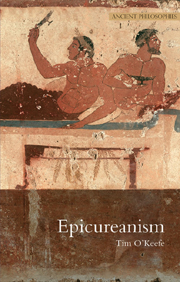Book contents
- Frontmatter
- Contents
- Preface
- Acknowledgements
- Sources and abbreviations
- Chronology
- 1 Introduction: the life of Epicurus and the history of Epicureanism
- I Metaphysics and physics: introduction and overview
- II Epistemology: introduction and overview
- III Ethics: introduction and overview
- Glossary of terms
- Notes
- Further reading
- Bibliography
- Index
II - Epistemology: introduction and overview
- Frontmatter
- Contents
- Preface
- Acknowledgements
- Sources and abbreviations
- Chronology
- 1 Introduction: the life of Epicurus and the history of Epicureanism
- I Metaphysics and physics: introduction and overview
- II Epistemology: introduction and overview
- III Ethics: introduction and overview
- Glossary of terms
- Notes
- Further reading
- Bibliography
- Index
Summary
Can we gain knowledge of the world? And if so, how do we gain knowledge of the world? These are two of the central questions asked in the branch of philosophy currently called “epistemology”, or the theory of knowledge. The Epicureans themselves call this part of their philosophy “canonic”, derived from the Greek word kanōn, or yardstick, and it is concerned with setting out the criteria of truth. The Epicureans are resolutely empiricist, with all of our concepts and knowledge ultimately being derived from the senses. Since the simple observation that there are bodies in motion serves as the linchpin of their physics, they must secure the reliability of the senses against sceptical attack. They do so, trying to show that scepticism is self-refuting. But scepticism is not merely theoretically unpalatable, it is unliveable (Chapter 9).
The three criteria of truth are sensations, “preconceptions” and feeling (DL X 31). The Epicureans set out their “canonic” with their physics (DL X 30). And for good reason: Epicurean epistemology is closely related to their psychology, which they understand as a branch of physics, the study of nature. They give an analysis of sensation as a purely passive reception of impressions from the environment, and they make the startling claim that all of these sensations are true. Repeated sensations give rise to “preconceptions”, or basic concepts, and further concepts are generated by psychological operations on these basic concepts.
- Type
- Chapter
- Information
- Epicureanism , pp. 85 - 86Publisher: Acumen PublishingPrint publication year: 2009



